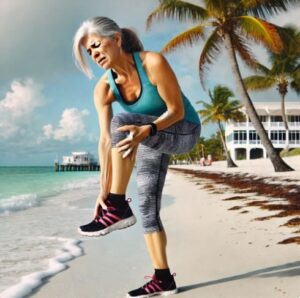Share this post
Zumba on the Beach Gone Wrong: Dr. Jason Pirozzolo Key West Orthopedics Physician on Acute Plantar Fasciitis Flare-Ups
Dancing in the sand under a Key West sunset sounds like a dream. But for a 50-year-old hotel receptionist, a high-energy Zumba class on a beach near Casa Marina turned into a painful experience. The uneven sand, constant jumping, and lack of arch support led to an acute plantar fasciitis flare-up, making each step excruciating. Plantar fasciitis is a common but frustrating foot condition that affects millions of active individuals. While it often develops over time, sudden flaring episodes can result from improper surfaces, excessive impact, or inadequate foot support. Dr. Jason Pirozzolo, a leading expert in sports medicine and orthopedics, explains why plantar fasciitis occurs and how to recover effectively.
What Is Plantar Fasciitis?
“The plantar fascia is a thick band of connective tissue that runs along the bottom of the foot,” explains Dr. Jason Pirozzolo. “Its role is to absorb shock and support the arch. But excessive strain causes tiny tears, leading to inflammation, stiffness, and pain—especially with the first steps in the morning.”
Beach workouts, particularly on soft, unstable sand, increase foot strain significantly. “Jumping movements require extra stabilization, and when performed on sand, the plantar fascia works harder than it would on a flat surface,” adds Dr. Pirozzolo. “Without proper support, the tissue becomes overloaded, triggering a painful flare-up.”
Symptoms of a Plantar Fasciitis Flare-Up
A sudden flare-up of plantar fasciitis can feel debilitating. Common signs include:
- Sharp heel pain, particularly in the morning or after prolonged standing.
- Tightness or stiffness in the arch of the foot.
- Pain that worsens after exercise but subsides with rest.
- Tenderness near the heel, especially when pressing on the bottom of the foot.
Ignoring early warning signs can lead to chronic discomfort, making daily activities difficult. Dr. Jason Pirozzolo stresses the importance of immediate treatment to prevent long-term damage.
How to Treat Acute Plantar Fasciitis
For those suffering a flare-up, Dr. Jason Pirozzolo outlines the most effective treatment methods:
- Rest and Activity Modification
- “Avoid high-impact activities like jumping, running, or prolonged standing,” advises Dr. Pirozzolo.
- “Switch to low-impact exercises like swimming or cycling while the inflammation subsides.”
- Icing and Anti-Inflammatory Measures
- “Applying ice packs to the heel reduces pain and swelling,” explains Dr. Pirozzolo.
- “Use nonsteroidal anti-inflammatory drugs (NSAIDs) like ibuprofen for relief.”
- Stretching and Mobility Work
- “Tight calves and Achilles tendons place extra strain on the plantar fascia,” says Dr. Pirozzolo.
- Effective stretches include:
- Calf stretches (leaning against a wall with one foot behind).
- Towel toe stretches (pulling the toes back with a towel).
- Rolling the foot over a frozen water bottle to massage the fascia.
- Supportive Footwear and Orthotics
- “Ditch the flip-flops and unsupportive shoes,” warns Dr. Pirozzolo.
- “Wear arch-supporting sneakers or use custom orthotics to reduce stress on the fascia.”
Why Sand Workouts Increase Foot Injury Risk
Many people believe exercising on the beach is a great way to increase endurance and balance. While sand training has benefits, it also carries hidden dangers.
- Soft surfaces lack stability. The foot works harder to stay balanced, overstressing the arch.
- Jumping on sand requires greater force. This overuse can strain foot structures.
- Lack of footwear support. Many participants exercise barefoot, increasing shock absorption directly on the plantar fascia.
“Sand workouts are not ideal for individuals prone to foot conditions,” cautions Dr. Jason Pirozzolo. “While fun and challenging, they should be approached with caution—especially for Zumba, where jumping is involved.”
Preventing Plantar Fasciitis Flare-Ups
Prevention is the best strategy when it comes to foot health. Dr. Jason Pirozzolo provides key prevention tips for athletes and active individuals which he sees in his Key West Orthopedics clinic environment:
Strengthen the Foot Muscles
- Perform toe curls and resistance band exercises to build foot resilience.
Stretch Daily
- Include calf and arch stretches in your morning and evening routine.
Wear Supportive Shoes
- Opt for stability sneakers with cushioned insoles instead of flat sandals.
Gradually Increase Activity Levels
- Avoid sudden intensity jumps in training, especially on unfamiliar surfaces.
Listen to Early Pain Signals
- “Mild discomfort is a warning sign,” says Dr. Pirozzolo. “Ignoring it leads to chronic inflammation and longer recovery times.”
When to See a Doctor
If plantar fasciitis pain persists beyond two weeks, seeking professional medical advice from places like Dr. Pirozzolo’s Key West Orthopedics clinic is essential. Dr. Jason Pirozzolo advises visiting a sports medicine specialist if:
- Pain worsens despite home treatment.
- You experience sharp or stabbing sensations that don’t improve.
- There’s swelling, redness, or heat in the heel.
- Walking becomes difficult or unbearable.
“Severe cases may require physical therapy, corticosteroid injections, or advanced regenerative treatments,” explains Dr. Pirozzolo. “Early intervention prevents complications and speeds up recovery.”
Final Thoughts
Plantar fasciitis can disrupt an active lifestyle, but with the right approach, recovery is possible. Zumba on the beach may be fun, but training smart is just as important. Understanding injury risks, proper footwear, and early intervention ensures long-term foot health.
For expert advice on sports injuries, recovery strategies, and cutting-edge treatments, follow Dr. Jason Pirozzolo for insights into the latest developments in sports medicine. You may also visit a Key West orthopedic clinic for more information. His medical expertise helps athletes and active individuals stay pain-free and mobile.
Disclaimer: The scenario is based on true events; however, names, locations, and details have been altered to protect privacy.




















